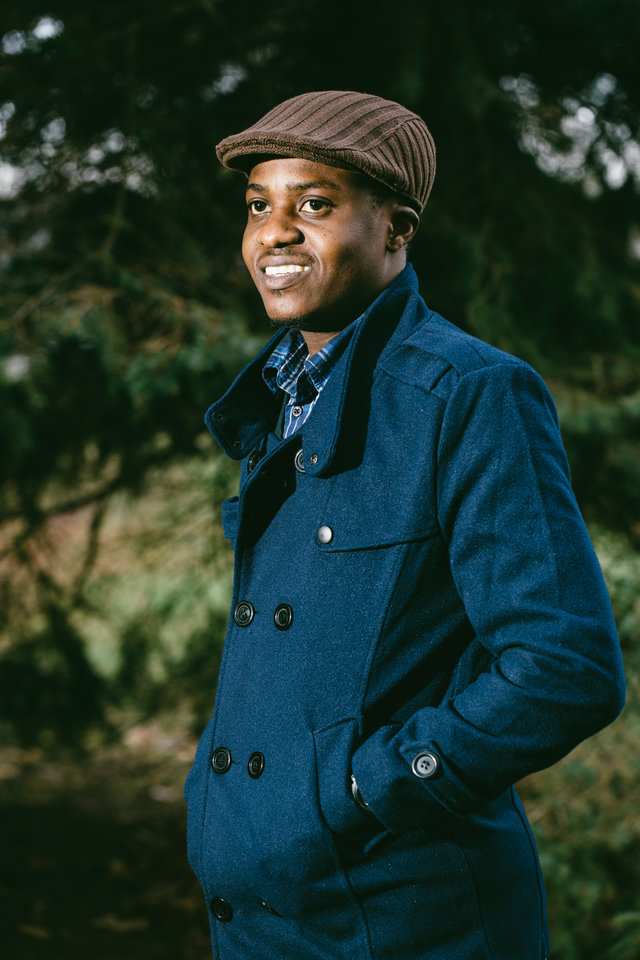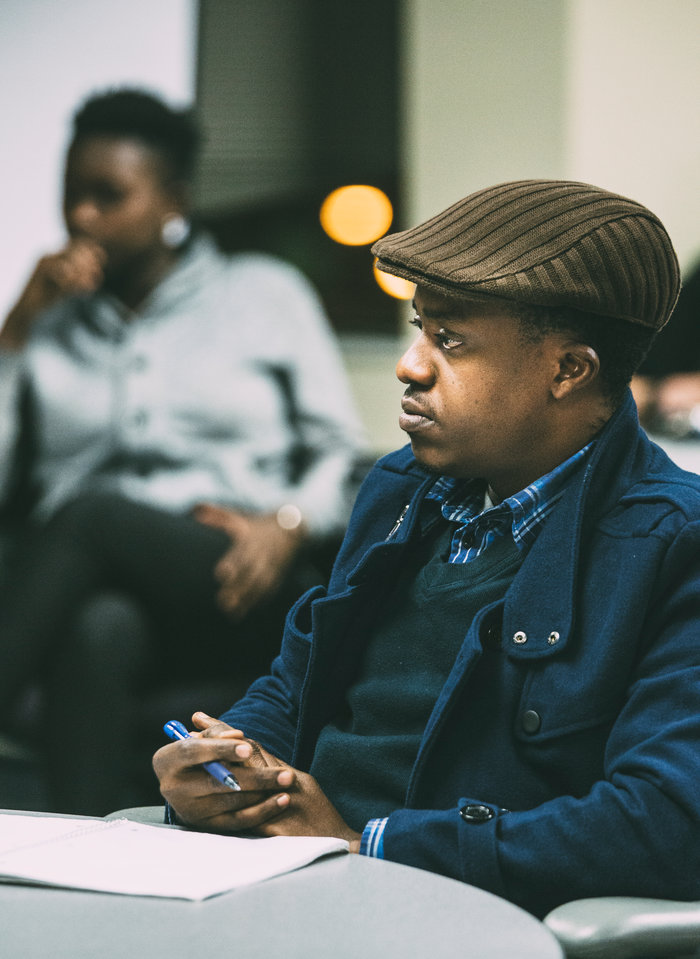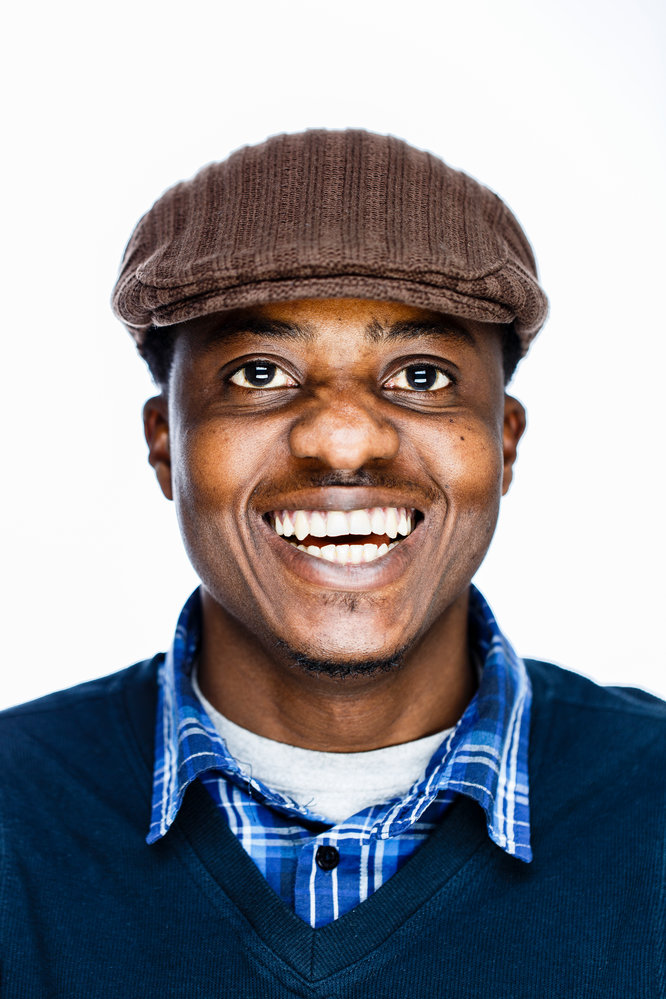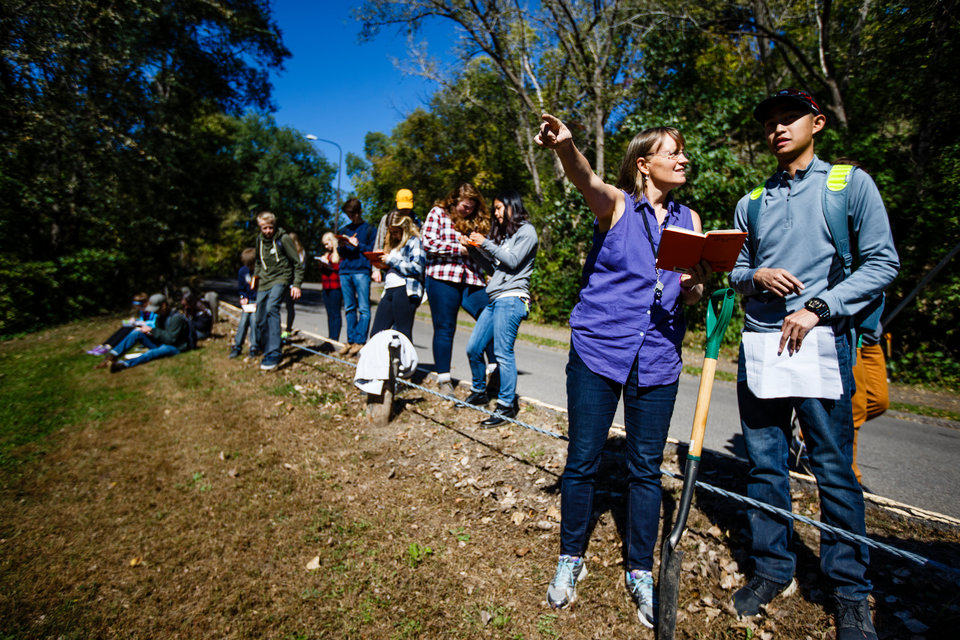Sam Olukiran knows how to smile.
It usually coincides with a laugh, which comes in a quick burst and seems ready to pop out at any given moment. His white teeth flash as he describes the reasons that he was drawn to St. Thomas and Minnesota, and again as he recognizes the somehow welcome temperature contrast to his home in Nigeria.
“I knew it was cold in Minnesota from watching on CNN,” Olukiran said. “I was actually looking forward to the cold because it’s just super hot in Nigeria. I thought, ‘I’m ready to be cold.’ When it’s cold you have a solution: Put on more clothes. When it’s that hot (in Nigeria), what are you going to do? Take off more clothes?”
Another laugh. Another smile.
Olukiran was raised in Ibadan, Nigeria, about two hours north of the country’s commercial capital, Lagos. Growing up in a large family that valued education, he and his five siblings all went to college before scattering around the country for work and marriage. Olukiran studied psychology at the University of Ibadan and, after graduating in 2011, was hired by a telecommunications company that he had worked for through college.
Despite enjoying the work, he knew he wanted to continue his education and better himself. He found and applied online to St. Thomas’ College of Education, Leadership and Counseling to study in the International Leadership program. Since CELC began offering a master’s degree in 2010 it has been the university’s most diverse degree program, consistently keeping an almost even split between international and U.S. students in each of its two-year cohorts, according to program director Jean Pierre Bongila.
International Leadership focuses on international education, economics, ethics, health care, and political development and underdevelopment, with a particular emphasis on examining countries in the Global South. A mix of international and domestic students has created a dynamic atmosphere of differing perspectives.
“It’s amazing to see how Americans learn more about other countries through conversations in our classroom,” Bongila said. “New students here internationally ... can also understand American culture a lot better through their classmates. It’s a close cultural experience we have in our classes.”
Those conversations are possible in large part because of students such as Olukiran, who traveled some 6,000 miles to be part of them.
“I was looking for courses that could help me make a difference in the world,” he said. “This was it.”
Talk to Olukiran’s professors and classmates and there’s a consensus: He’s going to make a difference. The sad thing is, he was almost killed before he had a chance.
A harsh reality
 Nigeria is a cash economy. The Central Bank of Nigeria has taken steps in recent years to reverse that fact and decrease the amount of cash in circulation, in large part because cash economics often lead to an increase in armed robberies. This reality continues to create many dangerous situations in Nigeria, a topic that was being discussed in one of Bongila’s classes when Olukiran raised his hand and shared just how real it was to him.
Nigeria is a cash economy. The Central Bank of Nigeria has taken steps in recent years to reverse that fact and decrease the amount of cash in circulation, in large part because cash economics often lead to an increase in armed robberies. This reality continues to create many dangerous situations in Nigeria, a topic that was being discussed in one of Bongila’s classes when Olukiran raised his hand and shared just how real it was to him.
In 2007 – while he was a college student in Nigeria – Olukiran had just withdrawn a sizable amount of cash from a bank in Ibadan, money to be used in a number of telecommunications franchises he and his cousin ran. As he walked down the street, a group of men stopped him. One of them pulled out a gun and demanded his cash. The next thing he knew, he was on the ground as blood poured out of a bullet hole in his neck.
A lagging emergency medical response infrastructure means that a majority of patients get to hospitals in Nigeria by private transportation. “It’s not like here where you call 911 and an ambulance comes and picks you up,” Olukiran said.
Lying on the street, alone, Olukiran was in serious trouble. But then an unlikely intervention took place.
“This woman I knew just happened to find me. She stopped a vehicle driving by and said, ‘You have to stop and help this guy. He’s my friend,’” Olukiran said. “She got me to the hospital. This woman I just knew from seeing her around. She’s in her 70s, but I would see her around and we would just talk, chat about life, and she knew who I was because we had become friends.”
Olukiran regained consciousness in the hospital to find his neck badly mutilated, but no major vein disrupted. He would be OK.
“I would say God used her to save my life,” he said. “I’m thankful for that.”
It’s not difficult to imagine the dropped jaws and looks on his St. Thomas classmates’ faces.
“He just brought it up as an example in class and I said out loud, ‘Wait, Sam, what?’ I don’t think anyone processed what he just said,” classmate and friend Jessie McShane said. “Sam was very happy to share his story and it was obviously incredible and amazing. No one said anything; we were just staring for like five minutes in awe of how amazing he is.”
Powerful conversations
 For McShane and other classmates, Olukiran’s example brought to life the kind of harsh issues that plague humans everywhere. Working together to understand those issues and what people can do to address them is at the heart of the International Leadership program, and plays out in the classroom every day.
For McShane and other classmates, Olukiran’s example brought to life the kind of harsh issues that plague humans everywhere. Working together to understand those issues and what people can do to address them is at the heart of the International Leadership program, and plays out in the classroom every day.
“The world is made up of different people like Sam, like myself, all the different constituents that we have in class. These people, whether they stay here or go back to their own countries, help shape the policies and thoughts of these places,” professor Vanjelis Ngwa said. “All these different things that are shaping the world, it’s important to have the different voices from around the world here together.
“The lens through which you see the world shapes how you behave and interact with it. Someone like Sam has a different perspective than someone like Jessie who grew up in Minnesota. ... If only Sam’s voice is at the table, the things that Jessie wants are not represented. If Jessie is the only decision maker who doesn’t take into account how things look and affect someone like Sam, you still have only one perspective at the table.
“I’m very blessed to have people like Sam and Jessie,” Ngwa said. “It gives me so much hope for the world. If they can be at the table together and speak in a way that's beneficial to both ... then they will take those perspectives and go out and help impact the world."
The value of each classmate to one another is not lost on them.
“Every time I leave our classes, I feel so enlightened and fulfilled. Sometimes enraged, but mostly really good about learning about these issues,” McShane said. “There’s hope for the future, and knowing I’m doing what I can to learn, to help these issues and push forward is empowering. People like Sam give me hope for issues abroad and here at home. People coming from abroad and sharing their cultures and stories, it’s really enlightening and rewarding.”
Not every story is as dramatic as Olukiran’s, but his underscores the unique perspective each and every person brings with him or her to a conversation, whether in the classroom of an international leadership course, or anywhere, at any time. For Olukiran, the takeaways from his own experience helped reinforce the need to better himself and to do everything he can to help others in difficult situations. While he said he would someday like to work for the United Nations, the most important aspect of his future work is that he “make a difference in the lives of the underprivileged, the homeless, the forgotten.”
That kind of help is needed everywhere.
“I see the world as one,” he said. “I can make a difference anywhere I am. There are Americans who are making a difference in Nigeria, Nigerians making a difference in America. We’re all over the world, making a difference together.
“We’re here for a moment, and we could be gone any time. You can’t wait,” Olukiran added. “You just have now to make a difference in the lives of people, neighbors, co-workers, anyone. You don’t know who might need you. If you just talk with someone and they feel you care about them, that could be huge. You may be there for a purpose.”
Olukiran has seen that purpose, and it helps carry him forward. He has shared himself with others, and they are joining him in doing what they can to make a difference in the world.
“Without other people we are nothing,” Olukiran said. “There is no life in isolation. Together, we achieve more.”
Read more from St. Thomas magazine.







